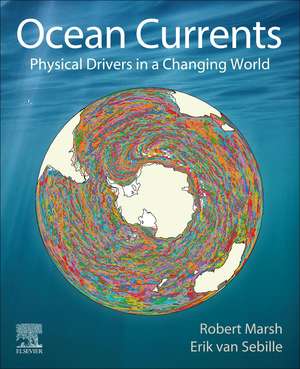Ocean Currents: Physical Drivers in a Changing World
Autor Robert Marsh, Erik van Sebilleen Limba Engleză Paperback – 24 iun 2021
- Provides analyses of ocean observations and numerical model simulations, highlighting the pathways and drift associated with ocean currents, around the World Ocean, linked to online exercises for instructors and students that extend this perspective
- Presents applications to natural phenomena, showing how ocean currents shape marine ecosystems, helping researchers understand the distribution and adaptation of life in the oceans
- Addresses societal challenges, specifically how ocean currents disperse pollutants (e.g. plastic) from coastal sources and how the global ocean circulation is central to our changing climate, helping students and researchers develop an interdisciplinary approach to global environmental change
Preț: 696.37 lei
Preț vechi: 883.25 lei
-21% Nou
Puncte Express: 1045
Preț estimativ în valută:
133.27€ • 138.62$ • 110.02£
133.27€ • 138.62$ • 110.02£
Carte tipărită la comandă
Livrare economică 07-21 aprilie
Preluare comenzi: 021 569.72.76
Specificații
ISBN-13: 9780128160596
ISBN-10: 0128160594
Pagini: 380
Dimensiuni: 191 x 235 x 30 mm
Greutate: 0.94 kg
Editura: ELSEVIER SCIENCE
ISBN-10: 0128160594
Pagini: 380
Dimensiuni: 191 x 235 x 30 mm
Greutate: 0.94 kg
Editura: ELSEVIER SCIENCE
Public țintă
Students and Researchers in Marine Biology, Biological Science, Marine Science, Oceanography, Environmental Science, Geography, and programmes involving marine policy and law, climatologists and scientists studying climate changeCuprins
1. Introduction to ocean currents - basic principles of cause and effect, measurement and modelling tools, etc.
2. Global gyres/Ekman drift - slow background flows and evolution/plastics/volcanic pumice/tsunami debris
3. Global western boundary currents and life - swift flows and marine life; dispersal of turtle hatchlings
4. Global eastern boundary currents and life - European Slope Current; Californian, Humboldt and Benguela Currents; links to upwelling and shifting ecosystems
5. Currents near the Equator and fast trans-basin flows - links to tropical climate variability (especially El Nino)
6. Connecting Oceans with upper ocean flows - Agulhas and Tasman leakage (connecting Pacific, Indian and Atlantic Oceans)
7. Polar currents, icebergs and sea ice - the Antarctic Coastal Current and the Labrador Current (conveying icebergs); the East Greenland Current (and sea ice)
8. Connecting shallow (warm) and deep (cold) currents with climate - the Atlantic Meridional Overturning Circulation; the global Conveyor Belt circulation
9. Seasonal flows in shallow shelf seas (around the world) and implications for pollution/biology
10. Indigenous (ancient) knowledge of ocean currents - e.g., colonisation of Australia, Polynesia
11. Utility of ocean currents for seafarers in recorded history - e.g., use of Gulf Stream for trans-Atlantic trade
12. Research Challenges and the Future - How might new technologies help us to develop a more complete understanding of ocean currents? How might currents change with climate, how might they change climate?
2. Global gyres/Ekman drift - slow background flows and evolution/plastics/volcanic pumice/tsunami debris
3. Global western boundary currents and life - swift flows and marine life; dispersal of turtle hatchlings
4. Global eastern boundary currents and life - European Slope Current; Californian, Humboldt and Benguela Currents; links to upwelling and shifting ecosystems
5. Currents near the Equator and fast trans-basin flows - links to tropical climate variability (especially El Nino)
6. Connecting Oceans with upper ocean flows - Agulhas and Tasman leakage (connecting Pacific, Indian and Atlantic Oceans)
7. Polar currents, icebergs and sea ice - the Antarctic Coastal Current and the Labrador Current (conveying icebergs); the East Greenland Current (and sea ice)
8. Connecting shallow (warm) and deep (cold) currents with climate - the Atlantic Meridional Overturning Circulation; the global Conveyor Belt circulation
9. Seasonal flows in shallow shelf seas (around the world) and implications for pollution/biology
10. Indigenous (ancient) knowledge of ocean currents - e.g., colonisation of Australia, Polynesia
11. Utility of ocean currents for seafarers in recorded history - e.g., use of Gulf Stream for trans-Atlantic trade
12. Research Challenges and the Future - How might new technologies help us to develop a more complete understanding of ocean currents? How might currents change with climate, how might they change climate?
